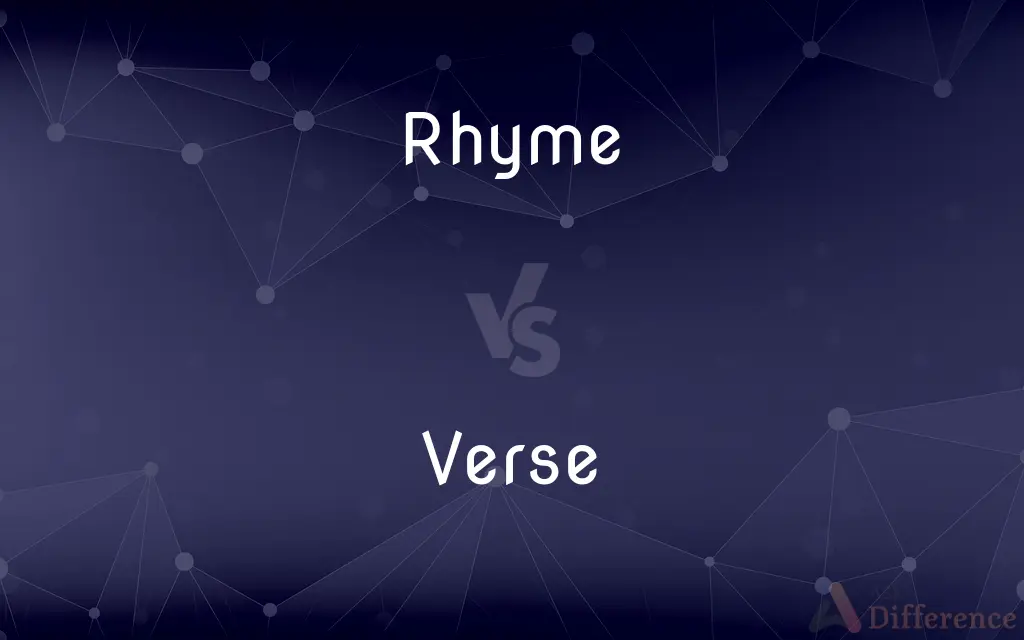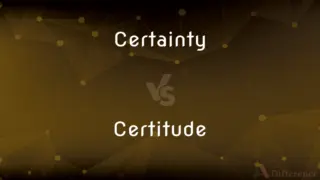Rhyme vs. Verse — What's the Difference?
By Maham Liaqat & Urooj Arif — Updated on April 21, 2024
Rhyme refers to similar ending sounds in words, often used in poetry, while verse denotes a single line or a stanza in a poem, structuring content.

Difference Between Rhyme and Verse
Table of Contents
ADVERTISEMENT
Key Differences
Rhyme involves the repetition of similar sounds in the final syllables of words, typically used to enhance the musicality of poetry. On the other hand, verse refers to a single metrical line in a poem or a stanza, which is a grouped set of lines within a poem.
Rhymes can be structured in various patterns such as ABAB or AABB, contributing to the aesthetic and rhythmic quality of a poem. In contrast, verses serve as the building blocks of a poem’s structure, organizing ideas and themes into coherent segments.
The use of rhyme is primarily to create a pleasing sound and to forge connections between different words, enhancing memorability and engagement. Verses, however, focus on advancing the narrative or emotional journey of the poem, often punctuating thoughts and pacing.
Different types of rhymes, such as end rhymes, internal rhymes, and slant rhymes, offer poets diverse tools for expression and sound play. Conversely, verses can vary in length and form, adapting to different poetic forms like sonnets, haikus, or free verse.
Rhyme schemes are often specific to cultural contexts and poetry styles, influencing how rhymes are perceived and used. Verse structures, on the other hand, can reflect historical and cultural influences in poetry, indicating shifts in literary traditions and conventions.
ADVERTISEMENT
Comparison Chart
Definition
Matching sounds at ends of words
A single line or group of lines in a poem
Primary Function
Enhance musicality and engagement
Structure content and express ideas
Types
End, internal, slant rhymes
Free verse, blank verse, rhymed verse
Usage
Found within lines or at line ends
Comprises entire poems or parts thereof
Cultural Significance
Varies by poetic tradition
Reflects historical and poetic forms
Compare with Definitions
Rhyme
Can be classified into various types including masculine, feminine, and slant rhymes.
The slant rhyme between hold and bald added a subtle depth to the verse.
Verse
Acts as the structural component of poetry, dividing it into manageable, thematic parts.
The first verse set the scene, while the subsequent verses explored the characters' emotions.
Rhyme
A repetition of similar sounding words occurring at the end of lines in poems or songs.
She spoke of times that rhymed with silver chimes.
Verse
Enables poets to experiment with layout and pacing, affecting how a poem is read and perceived.
Shorter verses accelerated the pace, creating a sense of urgency.
Rhyme
Enhances the musical quality of poetry, making it more enjoyable and memorable.
The rhyme of heart and apart pulled at the listeners' emotions.
Verse
Refers to a single line of poetry, or a stanza, which is a series of lines grouped together.
Each verse of the poem introduced a new character in the story.
Rhyme
Often used to reinforce the connection between thoughts or concepts in poetry.
The rhyme linked the moon's glow to the flow of the tide.
Verse
Can vary widely in length and form, influenced by the type of poem being written.
The free verse lacked a strict meter, allowing for a more natural flow of words.
Rhyme
Creates patterns that can be predictable or surprising depending on the scheme.
The poem's AABB rhyme scheme set a rhythmic expectation that was cleverly subverted in the final stanza.
Verse
Often used to provide visual and rhythmic breaks in the text, aiding comprehension and aesthetic appeal.
The verses were spaced to give readers a moment to reflect between themes.
Rhyme
A rhyme is a repetition of similar sounds (usually, exactly the same sound) in the final stressed syllables and any following syllables of two or more words. Most often, this kind of perfect rhyming is consciously used for artistic effect in the final position of lines within poems or songs.
Verse
A single metrical line in a poetic composition; one line of poetry.
Rhyme
Correspondence of sound between words or the endings of words, especially when these are used at the ends of lines of poetry
Poetic features such as rhythm, rhyme, and alliteration
Verse
A division of a metrical composition, such as a stanza of a poem or hymn.
Rhyme
(of a word, syllable, or line) have or end with a sound that corresponds to another
Balloon rhymes with moon
Verse
A poem.
Rhyme
Correspondence of sounds at the ends of words or phrases, especially when involving the last stressed vowel and all succeeding sounds in each of two or more such words or phrases.
Verse
Metrical or rhymed composition as distinct from prose; poetry.
Rhyme
A word that exhibits such correspondence with another, as behold and cold.
Verse
The art or work of a poet.
Rhyme
A poem or verse employing such correspondence as a formal feature, especially at the ends of lines.
Verse
A group of poems
Read a book of satirical verse.
Rhyme
Poetry or verse of this kind.
Verse
Metrical writing that lacks depth or artistic merit.
Rhyme
To form a rhyme.
Verse
A particular type of metrical composition, such as blank verse or free verse.
Rhyme
To compose rhymes or verse.
Verse
One of the numbered subdivisions of a chapter in the Bible.
Rhyme
To make use of rhymes in composing verse.
Verse
To versify or engage in versifying.
Rhyme
To put into rhyme or compose with rhymes.
Verse
To familiarize by study or experience
He versed himself in philosophy.
Rhyme
To use (a word or words) as a rhyme.
Verse
To play against (an opponent) in a competition.
Rhyme
Rhyming verse (poetic form)
Verse
A poetic form with regular meter and a fixed rhyme scheme.
Restoration literature is well known for its carefully constructed verse.
Rhyme
A thought expressed in verse; a verse; a poem; a tale told in verse.
Verse
Poetic form in general.
The restrictions of verse have been steadily relaxed over time.
Rhyme
(countable) A word that rhymes with another.
Verse
One of several similar units of a song, consisting of several lines, generally rhymed.
Note the shift in tone between the first verse and the second.
Rhyme
A word that rhymes with another, in that it is pronounced identically with the other word from the vowel in its stressed syllable to the end.
Verse
A small section of a holy book (Bible, Quran etc.)
Rhyme
(uncountable) Rhyming: sameness of sound of part of some words.
Verse
(music) A portion of an anthem to be performed by a single voice to each part.
Rhyme
(linguistics) rime
Verse
(obsolete) To compose verses.
Rhyme
(obsolete) Number.
Verse
(transitive) To tell in verse, or poetry.
Rhyme
(ambitransitive) To compose or treat in verse; versify.
Verse
To educate about, to teach about.
He versed us in the finer points of category theory.
Rhyme
Of a word, to be pronounced identically with another from the vowel in its stressed syllable to the end.
Verse
To oppose, to compete against, especially in a video game.
Verse him, G!
Rhyme
(reciprocal) Of two or more words, to be pronounced identically from the vowel in the stressed syllable of each to the end of each.
Verse
Metrical arrangement and language; that which is composed in metrical form; versification; poetry.
Such prompt eloquenceFlowed from their lips in prose or numerous verse.
Virtue was taught in verse.
Verse embalms virtue.
Rhyme
To somewhat resemble or correspond with.
Verse
A short division of any composition.
Rhyme
To number; count; reckon.
Verse
A stanza; a stave; as, a hymn of four verses.
Rhyme
An expression of thought in numbers, measure, or verse; a composition in verse; a rhymed tale; poetry; harmony of language.
A ryme I learned long ago.
He knewHimself to sing, and build the lofty rime.
Verse
A piece of poetry.
Rhyme
Correspondence of sound in the terminating words or syllables of two or more verses, one succeeding another immediately or at no great distance. The words or syllables so used must not begin with the same consonant, or if one begins with a vowel the other must begin with a consonant. The vowel sounds and accents must be the same, as also the sounds of the final consonants if there be any.
For rhyme with reason may dispense,And sound has right to govern sense.
Verse
One of the short divisions of the chapters in the Old and New Testaments.
Rhyme
Verses, usually two, having this correspondence with each other; a couplet; a poem containing rhymes.
Verse
A portion of an anthem to be performed by a single voice to each part.
Rhyme
A word answering in sound to another word.
Verse
To tell in verse, or poetry.
Playing on pipes of corn and versing love.
Rhyme
To make rhymes, or verses.
There marched the bard and blockhead, side by side,Who rhymed for hire, and patronized for pride.
Verse
To make verses; to versify.
It is not rhyming and versing that maketh a poet.
Rhyme
To accord in rhyme or sound.
And, if they rhymed and rattled, all was well.
Verse
Literature in metrical form
Rhyme
To put into rhyme.
Verse
A piece of poetry
Rhyme
To influence by rhyme.
Hearken to a verser, who may chanceRhyme thee to good.
Verse
A line of metrical text
Rhyme
Correspondence in the sounds of two or more lines (especially final sounds)
Verse
Compose verses or put into verse;
He versified the ancient saga
Rhyme
A piece of poetry
Verse
Familiarize through thorough study or experience;
She versed herself in Roman archeology
Rhyme
Compose rhymes
Rhyme
Be similar in sound, especially with respect to the last syllable;
Hat and cat rhyme
Common Curiosities
Can a poem have verses without rhymes?
Yes, many modern and free verse poems do not employ rhyme but still use verse structures.
What are some common verse forms in poetry?
Common forms include blank verse, rhymed verse, and free verse.
What is the main difference between rhyme and verse?
Rhyme focuses on the echoing of sounds in words, primarily at the end of lines, while verse refers to the actual lines or groupings of lines in a poem.
How does rhyme enhance a poem?
Rhyme adds musicality, aids memorability, and can emphasize certain words or themes within the poem.
Can verse structure affect the interpretation of a poem?
Absolutely, the structure of verses can significantly influence how a poem’s content is perceived and interpreted.
What is slant rhyme and how is it used?
Slant rhyme involves words with similar but not identical sounds, offering subtlety and complexity in the rhyming pattern.
Is rhyme necessary for a poem to be effective?
No, while rhyme can add to a poem’s aesthetic, many effective poems do not use rhyme at all.
What role does verse play in non-rhyming poetry?
In non-rhyming poetry, verse structures help to organize and present the poem’s themes and narrative.
How does cultural context influence rhyme and verse?
Cultural context can dictate the traditional forms and structures of poems, including common rhyme schemes and verse forms.
How do poets choose rhyme schemes?
Poets choose rhyme schemes based on the mood, rhythm, and style they wish to convey in their poetry.
Share Your Discovery

Previous Comparison
Flint vs. Quartz
Next Comparison
Certainty vs. CertitudeAuthor Spotlight
Written by
Maham LiaqatCo-written by
Urooj ArifUrooj is a skilled content writer at Ask Difference, known for her exceptional ability to simplify complex topics into engaging and informative content. With a passion for research and a flair for clear, concise writing, she consistently delivers articles that resonate with our diverse audience.














































